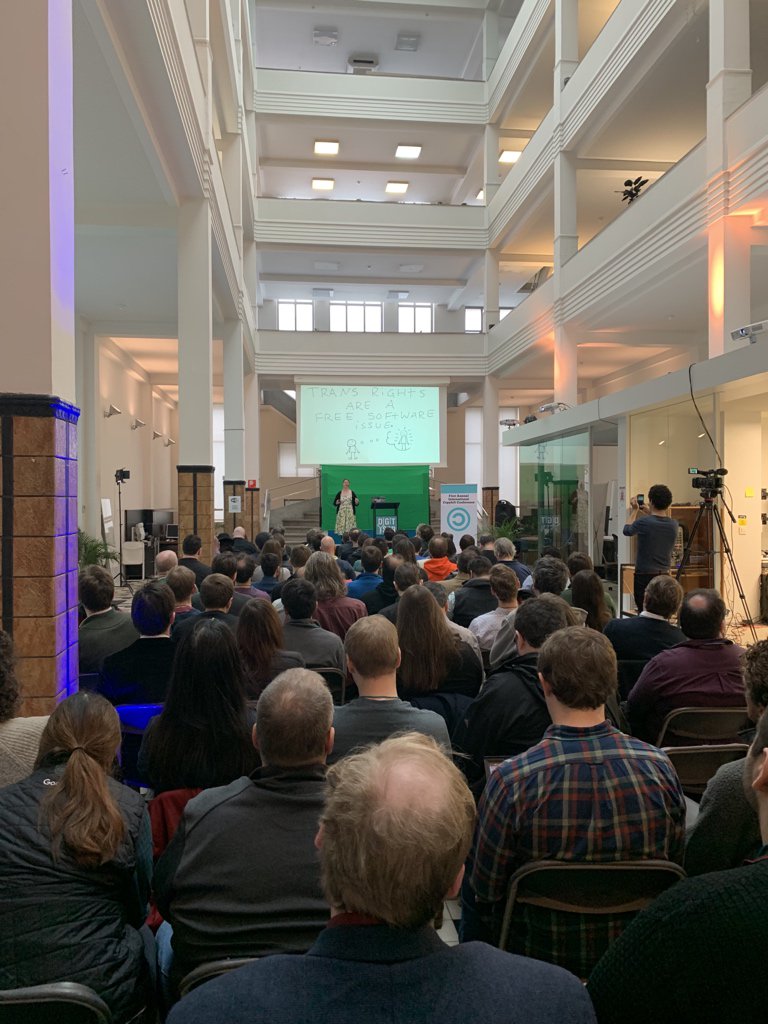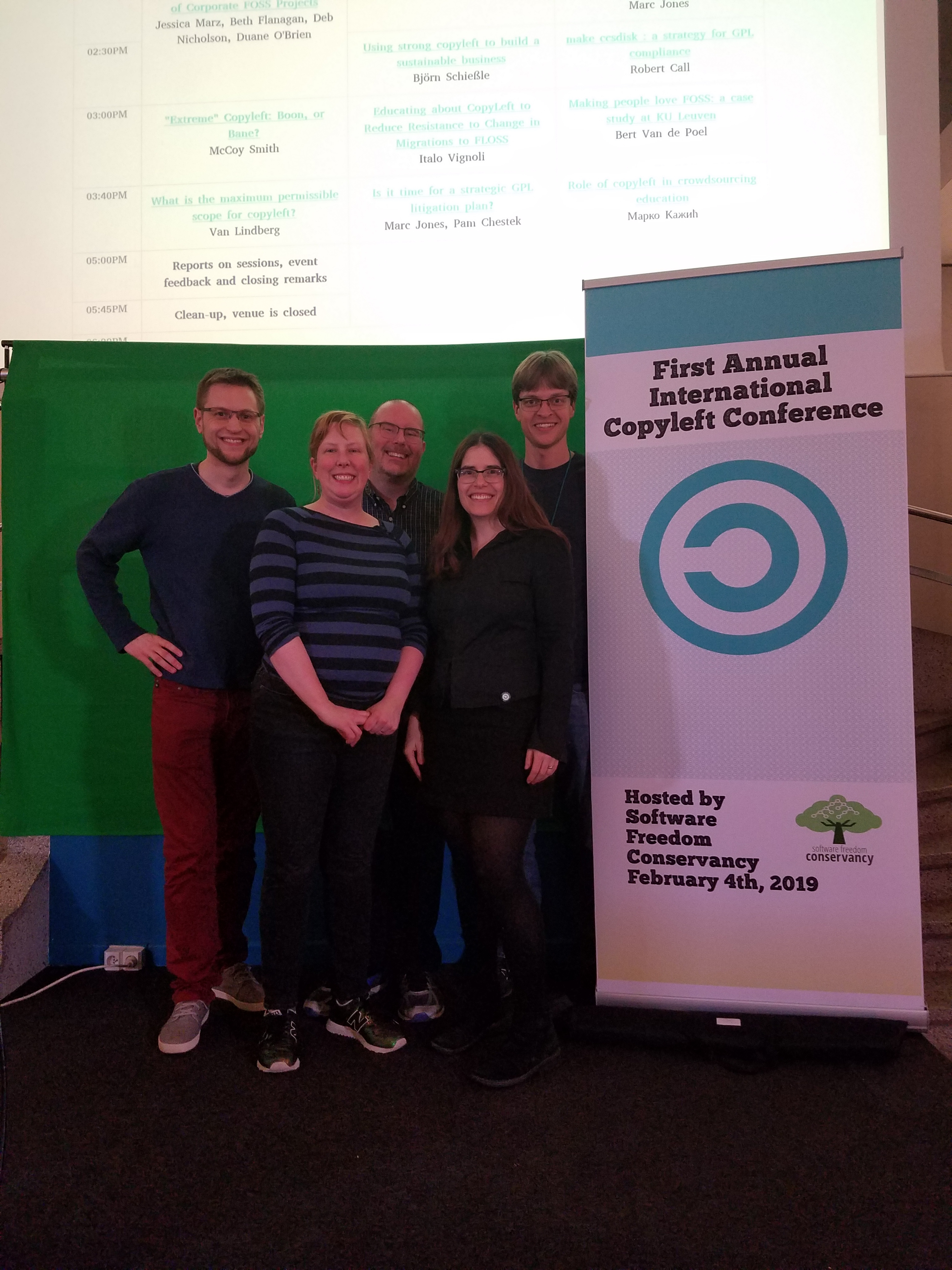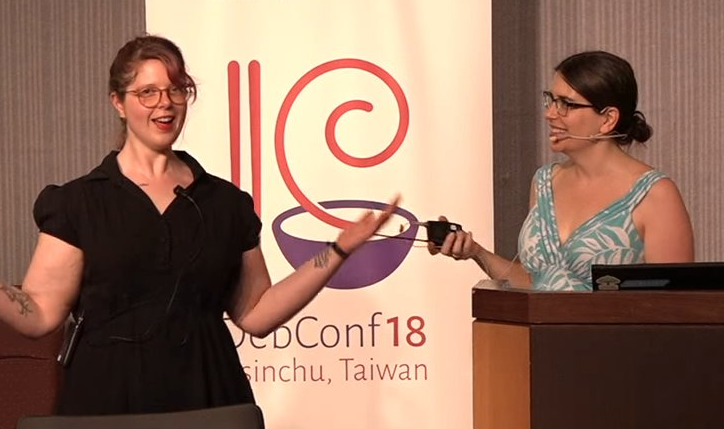![[RSS]](/static/img/feed-icon-14x14.2168a573d0d4.png) Conservancy Blog
Conservancy Blog
Displaying posts
tagged conservancy
![]()
Successful First Copyleft Conf!
by on February 22, 2019
Last year, in FOSDEM's Legal & Policy Devroom , we promised to hold an event co-located with the 2019 FOSDEM to have more in depth discussion around the legal issues that we care about as a community and in particular, copyleft. We made good on that promise and this year the first annual Copyleft Conf took place on February 4th. About 150 people came to the event from copyleft enthusiasts to the "copyleft curious." The venue, DigitYser was funky and accessible and walking distance from many downtown Brussels hotels.

By all accounts, it was a very successful first event. We had 25 speakers, panelists and discussion leaders -- including lawyers, coders, academics, non-profit employees and industry folks. The audience was extremely engaged, participating in discussions and asking great questions.
The Right Time
Here at Conservancy, we've wanted GPL compliance and copyleft licensing to be de-mystified and approachable for a long time. We also wanted to provide a place to talk about the future of copyleft; where else it might impactfully be applied, how it might evolve as technology changes and how it could best serve the next generation of users and developers. Additionally, we needed it to be a friendly, welcoming space where new folks and more experienced folks could begin to bridge some gaps.
Our Most Sincere Thanks
Thanks so much to our program committee, our onsite volunteers and everyone who helped us spread the word about the event. We want to especially thank our friends from the FOSDEM video team, who joined us the day after FOSDEM (which is already a massive gift to the free software community!) and spent the day live-streaming and recording all our sessions. Thank you as well to the lovely folks at DigitYser who went above and beyond to assist the video team and promote our event to the local Belgian community.

Copyleft Conf would've been nothing without our speakers and discussion leaders, or our inspiring keynote Molly deBlanc, who set a high-minded and altruistic goal for the day's discussions. We are also very grateful to our sponsors and of course, all our lovely attendees who took a chance and came out for an inaugural event.
What's Next?
We're so glad you asked! First of all, make sure you stay in touch by joining our low-traffic mailing list. Also, stay tuned, because video is coming. We will let you know when it's all up and we hope you'll share the sessions you liked with friends and colleagues. And finally, please let us know if you have thoughts for making Copyleft Conf better next time, via email. We'd love to hear from you.
Both images are licensed CC.BY.SA, the picture of Molly deBlanc was taken by Leslie Hawthorn and the staff picture by Deb Nicholson (with help.)
Volunteers needed in Brussels! Also, January is Busy.
by on January 25, 2019
Hello again, friends! January at Conservancy is a very busy month -- we launch an Outreachy round, close our financial year, finish up our year-end fundraising and then? Well, then we get ready to go out and talk to folks about software freedom and events like linux.conf.au and FOSDEM. In fact our Executive Director, Karen Sandler's talk on "Right Not to Broadcast" and our Distinguished Technologist, Bradley Kuhn's talk on "Preventing the IOT Dystopia with Copyleft" are both already up.
And, oh boy, are we at FOSDEM this year.
We could really use your help in several key areas:
- Helping us set up for video at Copyleft Conf on Sunday, February 3rd after FOSDEM in the evening
- Midday booth help on either Saturday or Sunday
- Saturday morning help bringing stuff to FOSDEM
- General conference staff support or video support on Monday the 4th at Copyleft Conf
If you are able to help out with any of these tasks, please drop us a note so we can schedule you. We will be eternally grateful for any slice of time you can offer. Small orgs like Conservancy depend on our supporters to pitch in -- thank you so much!
Thanks for Helping Us Meet Our Fundraising Challenge!
by on January 15, 2019
We're really excited to head into 2019 with our fundraising goals met. Thank you everyone (and their cats!) for sharing stories about our work these last two months. We really do rely on our supporters to tell their free software loving friends and colleagues about Conservancy. Thank you especially to Private Internet Access has supported our fundraising efforts with a $50K match -- they are true Conservancy champions! Thanks also to Molly de Blanc: Free Software Superstar, for organizing our biggest year-end match ever by bringing in more individual matchers than we've ever had.
 Molly was joined by Elana Hashman, Sage Weil, Josh Triplett, Matthew Garrett, Keith Packard, Martin Krafft, one anonymous donor and our pals at Private Internet Access.
Molly was joined by Elana Hashman, Sage Weil, Josh Triplett, Matthew Garrett, Keith Packard, Martin Krafft, one anonymous donor and our pals at Private Internet Access.
Thanks also to Purism and other stalwart friends like VM Brasseur who helped us by telling everyone they know that you should be donating to Conservancy. We are also honored that free software luminaries like; Katie McLaughlin, Leslie Hawthorn, Kade Crockford and Jeremiah Foster were willing to eloquently tell people why Conservancy's work is important to them.
Are you coming across this post after the fact? You can donate to Conservancy all year round, (it just won't be doubled) and we'll still use it to support a diverse, community-driven free software future. Thanks!
Free Software: Behind the Scenes
by on January 15, 2019
We wrote a few weeks ago about how Conservancy has several projects that support new people or less technical people and help bring new people into free software. We also support many projects that most folks probably don't think about very often. Many of our projects exist relatively outside of the spotlight and facilitate the creation of free software by providing tools, systems and infrastructure for developers.
Testing and Automation
Once you've got some code, how do you make sure it works everywhere you want it to -- in the way that you want it to? Testing and automation. Selenium is a suite of tools for browser automation. The W3C recommended their WebDriver tool as the best tool for the development of a more accessible and collaborative web last year. Just a few short months ago, we welcomed Reproducible Builds, a project that attests that your build is safe and uncompromised. The integrity of code is critical if you care about user safety and true software freedom and that's why each build needs to be tested and verified using a free software tool.
Interoperability and efficiency are also important. Projects that ignore this can find it hard to increase adoption. QEMU is a generic and free/open source machine emulator and virtualizer that helps developers build programs that work on different kinds of hardware. This lets developers create free software that works on all kinds of machines and with all kinds of hardware. Buildbot is a framework which enables software developers to automate software builds by scheduling different pieces of work. Both tools help developers create software that is useful to all kinds of users on all different systems.
Freedom All the Way Down the Stack
It's a little easier to expain why you want software for the tools that users directly interact with, but what about the tools that most users never see? The bits that talk to the hardware, the pieces that turn on your machine and the code that powers the internet also need to be free. You can't mix and match fee and non-free code and be sure you are getting all of the benefits of user freedom. That's why we are proud to spport so many projects that live close to the bare metal and work on critical interstitial bits that don't always get a lot of press.
Samba removes barriers to interoperability and is standard on nearly all distributions of Linux. Samba is what allows GNU/Linux and Unix machines to access file and print servers that are designed with Windows users in mind. This kind of hardware to hardware level interoperability makes it easy for folks to choose a free operating system for their personal machine, when their workplace or school isn't ready to switch.
Harvey OS provides a fully free operating system with a very compact kernel in which all resources are treated as files. This provides Unix users new ways of working with permissions and applications. Coreboot is an extended firmware platform, which provides users with a lightning fast and fully free boot system for desktops, laptops, servers and tablets. Start with freedom as soon as you boot!
We must have a free software foundation to build on top of, if we ever hope to offer users a completely free computing environment, both online and off. Linux XIA is a protocol stack for Linux that uses eXpress Internet Architecture (XIA) to enable a more trustworthy and interoperable internet while also improving continuity for network users.
Metalink is dedicated to improving downloads. Metalink makes it much easier for people — especially those in areas with inferior Internet connections — to download Open Source and Free Software. Just one non-free piece in the puzzle can counteract the intention to provide user freedom, privacy and security by that free software developers are working to provide throughout the rest of the stack.
Nuts and Bolts
We love supporting tools that free software developers use as part of their workflow to create more free software. We host three version control systems at Conservancy; Git, Mercurial and Darcs, which is a distributed revision control system written in Haskell.
We also support projects that help developers maintain their internal code. Kallithea is a free software source code management system that we use for many of our own scripts and systems. It lets teams easily maintain different versions of internal code projects. phpMyAdmin is a free and open source web interface for the MySQL and MariaDB database systems. It's a mature project that helps folks administrate their web-based MySQL instances.
Conservancy believes that everyone deserves full software freedom, without backdoors or exceptions. Developers deserve free tools and users deserve freedom all the way down to the bare metal. We don't live in that world just yet, but it's got to be built one piece at a time. Many of our projects aren't famous, but they're all important for securing full user freedom and that's why we support their work here at Conservancy.
Next page (older) » « Previous page (newer)
1 2 3 4 5 6 7 8 9 10 11 12 13 14 15 16 17 18 [19] 20 21 22 23 24 25 26 27 28 29 30 31 32 33 34 35 36 37 38 39 40 41 42 43 44 45 46 47 48 49 50 51 52
